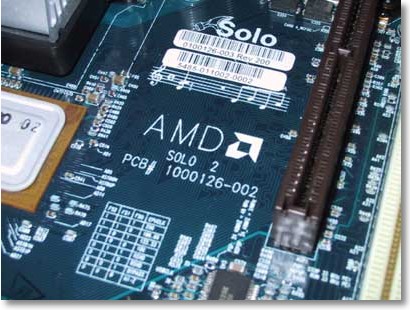 So a motherboard manufacturer that made the board of some test system that uses the new AMD ClawHammer technology decided to be humorous with the type of "Solo" that it stands for.
So a motherboard manufacturer that made the board of some test system that uses the new AMD ClawHammer technology decided to be humorous with the type of "Solo" that it stands for.
Wednesday, 27th of February, 2002
- We're playing some of the coolest stuff for the Wash U Symphony spring concert! We're playing Saint-Saëns' 3rd Symphony, the Organ Symphony! Wow, we get to use that organ in Graham Chapel! And we're also doing Mozart's Requiem, the whole thing with the completion by Robert D. Levin, with the Wash U chorus! I think we're trying to do the Petite Suite by Debussy that we didn't do last time too...
Thursday, 21st of February, 2002
- In my East Asian Capitalisms class we had a discussion on the corruption of the South Korean government under Park Chung Hee and Chun Doo Hwan. It broke down to defining what exactly corruption is, and it's actually harder than one might think to put into words. Mark L. Clifford's book Troubled Tiger implies that Park's corruption was with good intent, and he allowed it to exist and used it to help shape his plans for massive economic growth and industrialization. In fact, Clifford comments on the $500,000 in illegal foreign currency that was found in Park's personal safe after his death, and he says "In Park's defense, it is worth noting that at least most of the money stayed in Korea. 'The people who are corrupt [in South Korea] put their money into the country'" (93) I think that's a mildly amusing comment, and true, from an economic standpoint that as long as the money stays in the country and gets circulated around the economy, it drives growth.
- Snowball fighting
- Zamboni Racing
- Snowman Sculpting
- Freeze Tag
But on a more general note, corruption was a matter of life under Park's regime, since capital was very scarce in the country, and the only way businesses could get capital was if they had the necessary connections in government and their industry happened to be one the government wanted to promote. It became regular practice for businesses to give "gifts" to various government figures, and such. I suppose you can view this all as good intent, because it allowed the government to achieve what it thought was best for the country: promoting certain key industries and rationing scarce capital on it's own choosing, and rewarding companies that did well and pleased the government.
In the discussion in class today, near the end, a definition of corruption that was presented kind of reflects this idea of "good intent", and it was alluded to that corruption is ok if it's done with good intent. Unfortunately, this was presented in the last few minutes of class, cause I definitely have something to respond to that. My first reaction is, What is good intent? But more importantly, I think good intent is a totally inadequate way of distinguishing between corruption and just another way the government achieves it's goals. Corruption, according to Merriam-Webster, is "impairment of integrity, virtue, or moral principle". I have a good intention, say, I want to alleviate traffic problems on highway 40, I can do many things to try to solve it. In fact, one that comes to mind is to take out a machine gun and shoot every other car that drives by today. I've therefore eliminated half of the drivers that will be driving on it, and probably more will take Clayton Road tomorrow because they're afraid of their lives now. It's good intent, right? I'm more satisfied with Merriam-Webster's definition. Moral principle should never be sacrificed for whatever other intention, and ultimiately, someone pays for ignorance of moral values. In the South Korea example, a history of trust that the ruled had for the rulers has broken down, and has eroded the ability of the government to govern.
Therefore, it doesn't matter what kind of successes Park has had in his shaping of corruption to help build the economy, it's still corruption! Just because he was successful doesn't mean it's not corrupt.
Now if I only I can learn to think like this on my feet before class ends...
On a fluffier note, I ran across this survey on the passageway.org mailing list: Which of the following sports should be added to the Winter Olympics?
Wednesday, 20th of February, 2002
- I set up the Phillips AOL TV box for a client today, and it's quite a nifty little thing. It's essentially a stripped down computer with a TV card: it has a hard drive and all, and even a parallel port for printing. What isn't cool is the service. It takes forever to get connected with the service, a lot slower than normal dial-up users, so I'm starting to suspect AOL shafted the TV users. Hmmm...
Tuesday, 18th of February, 2002
- I've had this idea lately about how we can solve highway congestion. We can charge a toll, say, $2 for use of highways during peak periods, and less during medium-level periods, and basically make it free for nights and weekends. That will encourage more people to run their errands when highway use is not as high in demand, and maybe even force some people to move their work shifts an hour earlier or later. Of course, this is just the economically justifiable way of doing it... but I'd have to actually think if I'm willing to pay $2 to get on that tollway and be guanranteed no congestion, of if I can just bear the congestion and plan ahead before going somewhere. In St. Louis, I guess it's not so bad that such rash actions are needed, but I can forsee it helping in more congested areas.
Sunday, 17th of February, 2002
 Phantom of the Opera is so good! With thanks to Kevin, who provided me with the awesome opportunity to finally get to see a show at the Fox, and Phantom of all things. The musical itself is just so nice, and allows for all the crazy special effects and stunts they did. Definitely awesome - I was left completely entranced by the whole thing.
Phantom of the Opera is so good! With thanks to Kevin, who provided me with the awesome opportunity to finally get to see a show at the Fox, and Phantom of all things. The musical itself is just so nice, and allows for all the crazy special effects and stunts they did. Definitely awesome - I was left completely entranced by the whole thing.
Thrusday, 14th of February, 2002
- In my East Asian Capitalisms class, we're currently studying about South Korea, and reading the book Troubled Tiger - Businessmen, Bureaucrats, and Generals in South Korea by Mark L. Clifford. It's a great book, and I thought it was particularly funny at one point where Clifford was describing the extent to which the Korean CIA monitored business in the 70s - "One morning the manager of a foreign bank branch in Seoul came into his office to find several garbled telexes. He asked his Korean secreatry to notify the senders to resend the messages. She told her foreign boss that it would be easier simply to contact the KCIA, which kept copies of all incoming messages. She did, and a few hours later the bewildered manager received copies of his telexes, along with a card stating that these had been provided with the compliments of the KCIA." Wow...
Wednesday, 13th of February, 2002
- "Blamestorming - Sitting around in a group discussing why a deadline was missed or a project failed and who is responsible." Oh how true it is sometimes, the time we waste pointing fingers and not fixing things. Just a thought.
Tuesday, 12th of February, 2002
 The person at the Cingular Store called me back! They got a new shipment of these vibrate modules - maybe they got a bad batch or something, but we'll see how this goes.
The person at the Cingular Store called me back! They got a new shipment of these vibrate modules - maybe they got a bad batch or something, but we'll see how this goes.
Saturday, 9th of February, 2002
- I went to the Cingular Store again to complain about the vibrate module that they sold me. It's the second one that I've tried and this one is more defective than the first - it hardly ever vibrates when it rings and of course it vibrates randomly. The guy there was very nice though, and they didn't have any in stock but he said he'd call me when they come in. But he definitely said it isn't a problem with the phone, and I guess passed the blame over to Ericsson a little by saying that they might have must engineered a bad product.
Friday, 8th of February, 2002
- The new overclocking world record!

